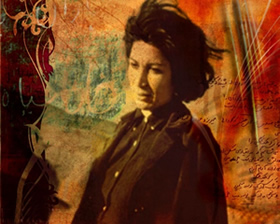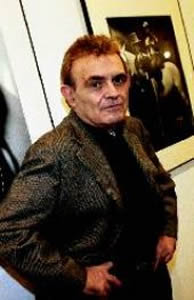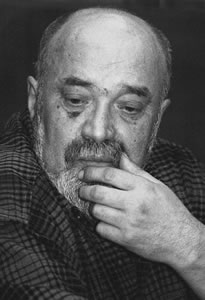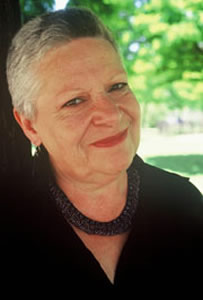De Iraanse dichteres Forough Farokhzad werd geboren op 5 januari 1935 in Teheran. Zie ook alle tags voor Forough Farokhzad op dit blog.
Conquest of the Garden
The crow that flew over us and sank-
in the confusion of a vagabond cloud;
The crow that swiftly crossed-
the extent of the sphere-
like a short arrow-
will tell about us-
in the town.
Everybody knows.
Everybody knows that you and I,
looked through the oblique crack of the wall-
and saw The Garden.
Everybody knows.
Everybody knows that you and I,
reached for the trembling branch of The Tree-
and picked the apple.
Everybody is scared.
Everybody is scared but you and I,
together joined lights,
mirrors and water-
and feared never.
For you and I,
it is not about a frail union of two names-
in the aged pages of a registrar notebook.
It is about my fortunate locks-
and the burning stroke of your kiss.
For you and I,
it is about the imminence of our skins-
in the sacred wellspring of lightly streams,
swiftly sliding -over the waterfalls and the hills.
And,
it is about the fountain’s songs-
its fleeting flight, its short, silvery life.
You and I,
in the core of a darkened night,
in the fluid freshness of forests,
on the peak of shielding mounts,
and in a freezing fearful sea-
asked young, golden eagles-
what we ought to do.
Everybody knows.
Everybody knows that we pierced-
into the silent dream of Phoenix.
Everybody knows.
Everybody knows that you and I,
In the prairies and the plains-
reached to the glittering roots-
of Truth.
Everybody knows.
Now, everybody knows that you and I,
in an endless instant, conquered the entirety of Eternity.
For you and I,
It is not about a shaking whisper in the dark.
It is about Day and its invading spark.
It is about a breeze over the fertile side.
It is about birth, evolution and pride.
It is about burning every futile piece-
in the garnet core of the flames.
And it is about our hands-
that contrived a bridge,
concrete and bright,
over the tear of night.
Come to the turf!
Come to the turf-
and call my name!
Call my name-
with a choral of white lilies-
like a gazelle who calls his mate.
The shades of dusk-
are floating in their veiled sorrow.
And doves,
from the windows of their white tower-
are looking at Earth.
Come to the turf!
Vertaald door Maryam Dilmaghani

Forough Farokhzad (5 januari 1935 – 13 februari 1967)
De Spaanse (Catalaanse) schrijver Terenci Moix werd geboren op 5 januari 1942 in Barcelona. Zie ook alle tags voor Terenci Moix op dit blog.
Uit: Der Traum der Kleopatra (Vertaald door Elisabeth Brock)
“Mit dem verschleierten Gesicht, dem verhüllten, gekrümmten Körper, war die arme Frau kaum wiederzuerkennen. Der edle Sosigenes jedoch trat auf wie immer. Er war die gleiche ehrfurchtgebietende Person, die seit den frühen Tagen des Bürgerkriegs, als Kleopatra ihren Gatten und Bruder, den Milchbart Ptolemaios besiegt und sich des ägyptischen Throns bemächtigt hatte, immer an ihrer Seite gestanden hatte. Sosigenes, einst ihr Erzieher und bewährter Berater, diente ihr heute als Stütze und Stab, als Blindenführer, der ihren taumelnden Schritten den Weg wies.
Kleopatra blickte auf ihre Umgebung, ohne etwas wahrzunehmen. Das trauernde Schiff fand seine Entsprechung in den Gruppen der betrübten Menschen, die sich am Ufer versammelten. Doch selbst diese Würdigung ihres Schmerzes berührte Kleopatra nicht.”

Terenci Moix (5 januari 1942 – 2 april 2003)
De Russische schrijver Yevgeni Anatoljewitsj Popov werd geboren op 5 januari 1946 in Krasnojarsk, Sibirië. Zie ook alle tags voor Yevgeni Popov op dit blog.
Uit: Mein Moskau
Auch ich bin, wie diese Filmheldin, vor 35 Jahren in zerrissenen Schuhen aus Sibirien nach Moskau gekommen, weshalb ich heute bezeugen kann: Früher änderte sich hier jahrelang gar nichts, und wir alle waren der Ansicht: «Das Reich Lenins wird nie ein Ende haben», wie es im letzten Brief eines buckligen Selbstmörders hiess, der sich in einer Erzählung Iwan Bunins, des vor den Bolschewiken geflüchteten künftigen Nobelpreisträgers, aufgehängt hatte. Heute hat sich alles geändert, möchte man sagen, doch will ich mit einer so kategorischen Behauptung eher vorsichtig sein, nicht nur aus Aberglauben, auch aus Liebe und Genauigkeit.
Was war früher? Hysterische Langeweile befiel den einfachen Moskauer, wenn er abends auf die Strasse seiner schlecht beleuchteten Stadt trat, deren Schmuck – die Spruchbänder RUHM DER KPDSU – wie ein Menetekel im Dunkeln schimmerte. In «Der Meister und Margarita», dem Roman des Satirikers Michail Bulgakow, drückt das eine der Figuren so aus: «Wäre nicht das Kartenspiel, wäre das Leben in Moskau völlig unerträglich.» Und wäre nicht der Wodka, füge ich hinzu.
In den letzten Jahren unter kommunistischer Herrschaft war im Vergleich mit den Zeiten Stalins und Bulgakows das Warenangebot in den Geschäften sehr geschrumpft, und in den missmutigen, sich stundenlang hinziehenden Wurstwarteschlangen wurde Jahr um Jahr über das Problem debattiert, wer daran schuld sei, die Provinzler, die in Moskau Lebensmittel einkauften und sie taschenweise in ihre Kleinstädte verschleppten, wo es niemals Wurst zu kaufen gab, oder die «verfressenen Moskauer», die von ganz Russland gemästet wurden, womit Russland zugleich den hergereisten Ausländern etwas vormachte, denen aus irgendwelchen Gründen ständig bewiesen werden musste: SOWJETISCH HEISST VORTREFFLICH und DER KOMMUNISMUS IST DIE LICHTE ZUKUNFT DER GESAMTEN MENSCHHEIT.”

Yevgeni Popov (Krasnojarsk, 5 januari 1946)
De Argentijnse dichteres en schrijfster Luisa Futoransky werd geboren op 5 januari 1939 in Buenos Aires. Zie ook alle tags voor Luisa Futoransky op dit blog.
Uit: The Formosa
“I don’t know why, who knows they don’t either, but the whole gang of us they gave pet nicknames that to this day we haven’t been able to shake off. They must have thought it was affectionate. Chola, Quique, Bochi, Chiqui, Dito, Cacho, Pichi, Michi. With variants, like for example, Pichita and Pichona. Cachito, Mincho, Bicho and Biche.
The mothers in turn were identified by their grandmothers or by the flaws the families suffered. But when the dimensions of the capitals of Eldorado reached beyond main street and the surroundings of the shtetl, they recognized each other by the distant neighborhood they came from, tenaciously preserving however a few threads from the old Jewish districts, indelible before the bloody or bloodless advances of assimilation.
So, Sonia was never Sonia but Sonie from Urquiza, Dora was Dobresh from Nazca; Clara, Jaique the cripple from Parque Chas. Rujl was never called Raquel, but Rujl from the Center to distinguish her, since she was richer, from the Rujl from the outskirts, from Ramos Mejía. Ite was always Ite and bobe. No matter how much I revise, shake, or rake the tree in every direction, I find neither a Reina nor a Fortuna, as occurs in Sephardic families. With a mere princess or Joy, I, we, might have been content; that must be the reason it was for us how it was or continues to be.
We kept separating from one another like tuna or swordfish steaks not too fresh in the fish market. Not so much smell of fish, but you can see that the meat has lost its initial firmness and oozes softish pink blood over the marble counter top that they’ll have to wash down with the brush made of the same material as those brooms, the best ones, the kind with five strands that used to be bought in a sort of store-shed rather in shadows, where you’d find piled up bags of potatoes, onions and coal. The bags of thick sackcloth were identical and they came in sizes of ten or twenty-five kilos, but by touch you could guess the contents; sharp edges for the coal, roundnesses for potatoes and onions. To sit there on your bottom procured other sensations”.

Luisa Futoransky (Buenos Aires, 5 januari 1939)
